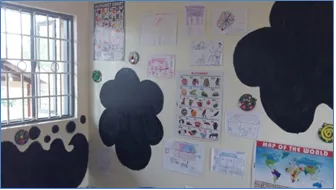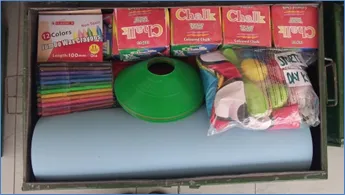Finishing field activities in Kyaka II…

The last blog focused in on one area of change that refugee children highlighted in Kyaka II - child friendly information on the refugee protection process – and gave one example of how this might be addressed. Other areas will be similarly focused in on in later blogs, for example child friendly refugee protection interviews and Reception Centre designs from refugee children.NEW_LINENEW_LINEIn this blog, however, since the fieldwork period in Kyaka II has come to an end, it is important to provide a brief summary of the last month’s activity in the field (building on the summary provided in the earlier blog ‘Starting to think about change…’).NEW_LINENEW_LINESummary of activity The Researcher spent eight weeks in total conducting fieldwork in Kyaka II, funded by the HIF Small Grant (April 13th to June 9th). 16 semi-structured interviews were conducted with humanitarian practitioners from a range of organisations about child participation in the refugee protection process and innovation. Over 250 refugee children were involved in participatory workshops held across the settlement focusing on the refugee protection process, including groups of unaccompanied and separated children, children living in the Protection or Reception Centres and those participating in child protection clubs in primary schools. There was observation of BID (Best Interest Determination) interviews with unaccompanied and separated children as well as registration and RSD (Refugee Status Determination) interviews with children both in families and on their own. As a result of this activity, a large bank of first-hand data has been built up for analysis and review.NEW_LINENEW_LINEAlongside the research activity, the Researcher also engaged in capacity building, information dissemination and review, particularly towards the end of the fieldwork period. Refugee support workers were given training on participatory techniques and methods and child friendly translation and provided with resources and materials (‘toolkits’) to support ongoing work with refugee children in the settlement. Training sessions were also delivered on participatory methods and child friendly interviewing to field staff in Kyaka II (GIZ, UNHCR, OPM, Windle Trust) as well as to UNHCR and partner (Interaid) protection staff in Kampala. Debrief sessions on the project activity were undertaken with support staff and key protection staff in Kyaka to reflect on initial findings and get reactions and reflections. A presentation for all humanitarian staff working in Kyaka II (over 100 people) was held at the end of the fieldwork period to provide an overview of the project, initial findings and children’s views and opinions on their own protection and participation in the settlement. Children’s groups from the participatory workshops were given information on the research process, what happens next and how they would receive feedback on the results.NEW_LINENEW_LINESmall ‘products’ were also generated by the Researcher, working with others in Kyaka II – a child friendly poster (see blog on Child friendly information on the refugee protection process…’) a child friendly interview room for UNHCR (see photo) children’s banners and posters for the Reception Centre and participation resource boxes (see photo) for Community Protection Workers, the UNHCR interview room and the Reception Centre. The Researcher has also begun working on a child friendly interview pack for the refugee protection context.NEW_LINENEW_LINE

NEW_LINENEW_LINE

NEW_LINENEW_LINE
Stay updated
Sign up for our newsletter to receive regular updates on resources, news, and insights like this. Don’t miss out on important information that can help you stay informed and engaged.
Explore Elrha
Learn more about our mission, the organisations we support, and the resources we provide to drive research and innovation in humanitarian response.


.png)